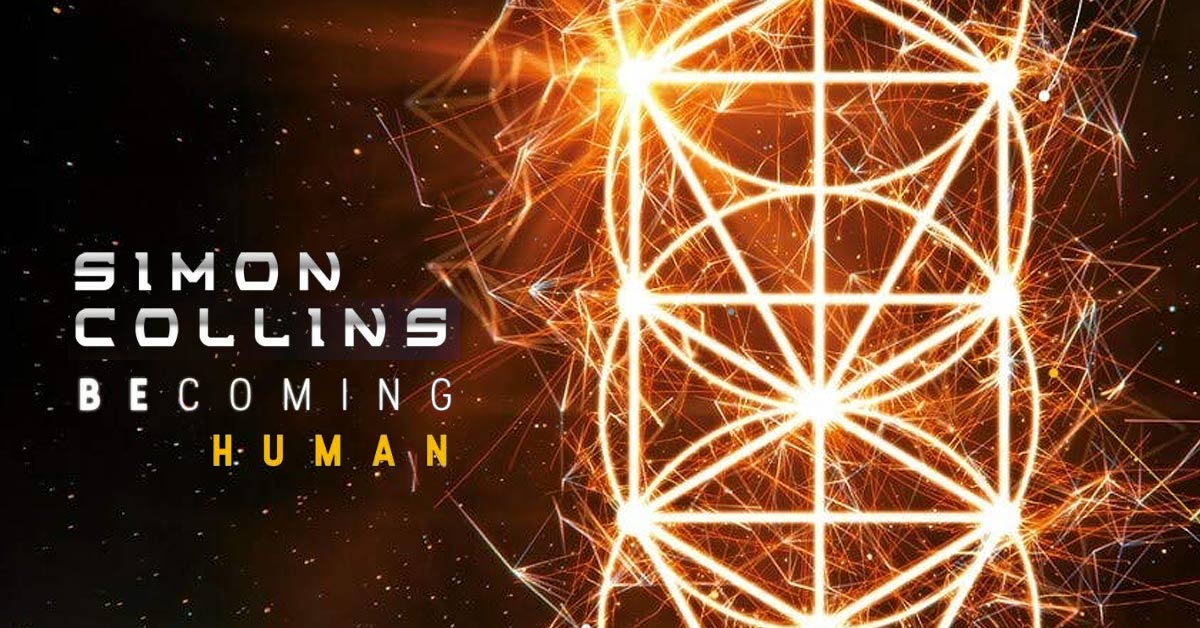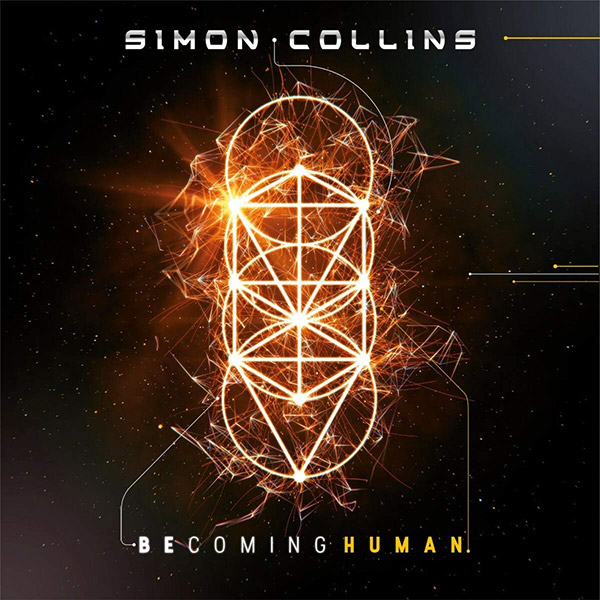


When Simon Collins and his band Sound Of Contact brought out their album Dimensionaut seven years ago, in 2013, it was received very well. They opened for Spock’s Beard on their European tour and played at the Night Of The Prog festival. Everything appeared set for the next step of the project. Their social media channels mentioned new writing sessions, but then things became muddled. The band dissolved, reunited, and soon after that the tabloids ran a story on Simon Collins being arrested for possession of illegal drugs (charges were dropped completely). Musically, however: nothing. Simon Collins and Dave Kerzner went their separate ways. While Kerzner has released a plethora of albums geared towards a retro-prog audience, Collins needed more time before he finally brought out Becoming Human as the successor to his third solo album U-Catastrophe (2008) in September 2020.
In an interview he told the Sonic Perspectives website that the complicated situation in the band coincided with a difficult period in his personal life. He had problems with substance abuse (as had been reported several times before) and went through a divorce. Only after he moved to Ireland did Simon find the quiet to complete his solo album in his own studio. His most important partner in this endeavour was Robbie Bronnimann. Bronnimann, whose specialty is electronica and remixes, produced the album, designed sound and co-wrote eight of the tracks. His influence on the album is very obvious, but of course electronica is nothing new for Simon Collins who had some electronica songs on his debut album and also worked as a DJ. Collins strengthened the electronic side of the sound by using only V-drums, i.e. an electronic drum-kit, the album is not pure electronica as both Collins’s drumming and his singing style are very much based in rock music. The song structures and the instrumentation with bits of piano and guitar point at his progressive vein. An additional influence came from his bandmates from Sound Of Contact, which whom he wrote three songs. Collins’s stated goal was to create a hybrid of electronic and progressive influences.
The lyrics address personal matters as well as mankind’s big questions. As on Dimensionaut, science-fiction features prominently. "I'm not just writing songs about who I am, I'm writing songs about who I'm striving to be.”, he told Sonic Perspectives, “It's a very personal album."
 The album begins with a short spacy synth intro called Into The Fray that would be entirely appropriate for a science-fiction film scene where a spaceship zooms by. Next up is the title track, Becoming Human, that has also been released as the first single. Its structure anticipates much of what we will hear on the rest of the album. Anthemic choruses move into sparsely instrumented verses in which the lyrics are spoken rather than sung. This gives a catchy song a momentum and created a hypnotic tension. Lyrically, Becoming Human is about (duh) becoming human spiritually. Collins was inspired by the astronomer and author Carl Edward Sagan, whose words “We are a way for the universe to know itself” he has had tattooed on his arm.
The album begins with a short spacy synth intro called Into The Fray that would be entirely appropriate for a science-fiction film scene where a spaceship zooms by. Next up is the title track, Becoming Human, that has also been released as the first single. Its structure anticipates much of what we will hear on the rest of the album. Anthemic choruses move into sparsely instrumented verses in which the lyrics are spoken rather than sung. This gives a catchy song a momentum and created a hypnotic tension. Lyrically, Becoming Human is about (duh) becoming human spiritually. Collins was inspired by the astronomer and author Carl Edward Sagan, whose words “We are a way for the universe to know itself” he has had tattooed on his arm.
The Universe Inside Of Me is the song that undergoes the most changes. After a futuristic beginning with percussive synth effects the song speeds up. In an instrumental section some three minutes into the song Collins really lets it all out on the drums while showing how he can sing. A minute or so later the song comes to a quiet, atmospheric bit. Another minute later you feel as if you were at a techno party (the reviewer has dim memories of the 1990s) and Collins shows his DJ credentials. Fans of traditional rock music will probably be ready to abandon the song at this point, but the song returns to the chorus and an atmospheric fade-out before that. The changes appear carefully designed instead of organically developed, and that’s why the song sort of falls apart into its segments – of all songs on the album, it is the most electronic song that suffers the fate of many a prog song.
Man Made Man begins with an intro that may remind you of Nine Inch Nails or a more recent Muse album. This Is The Time oscillates between cumbrousness and elegant beauty. The shortest track on the album (apart from the intro) is very personal as someone talks about his drug habit. Thoughts Become Matter has another intro of whirling synthies. Headphones reveal some fine stereo panning, then the drums come in with a strong rhythm and a note of Depeche Mode. The vocals stay in sprechgesang that only dissolves for the chorus.
The instruments are mixed way in the background in the beginning of I Will Be Waiting, but they move to the fore soon. Piano and distortion effects make the sound resemble recent pieces by Gary Numan before the drums come in mid-song. Collins showcases his knack for using the contrast between vocals and very few instruments on the one side and an overwhelmingly big wall of sound on the other side to create a dynamic tension in his songs
 No Love is an up-tempo pop song with some excellent drumming that might be even more impressive had it been played on acoustic drums. Living In Silence is another extremely dynamic song with percussive synth bass and sound effects. The chorus has anthemic qualities again. In 40 Years Collins describes his journey of four decades towards contentment and self-acceptance. Acoustic and electric guitars add new elements to the arrangement. This song more than any other has moments that sound a bit like his father’s songs. So Real has tasteful electric guitar with a Coldplay feeling – a potential radio hit.
No Love is an up-tempo pop song with some excellent drumming that might be even more impressive had it been played on acoustic drums. Living In Silence is another extremely dynamic song with percussive synth bass and sound effects. The chorus has anthemic qualities again. In 40 Years Collins describes his journey of four decades towards contentment and self-acceptance. Acoustic and electric guitars add new elements to the arrangement. This song more than any other has moments that sound a bit like his father’s songs. So Real has tasteful electric guitar with a Coldplay feeling – a potential radio hit.
Simon Collins saves the best for last. The longtrack Dead Ends (nine minutes) creates a threatening dark mood and uses piano and very subdued sprechgesang to present the dystopian science-fiction theme. A sonic thunderstorm breaks out three-and-a-half minutes into the song, and Collins really sings his heart out. Using this kind of contrast again he manages to create the biggest effect here and a grand finale.
Becoming Human is a mature album on which Simon Collins manages to combine pop-appeal and atmosphere. It has potential hits as well as varied and dynamic longtracks to entertain fans coming more from the prog scene. Dead Ends may well be the best piece he has written so far. The production is first-rate. The soundscapes and some of the effects may perhaps not be everybody’s cup of tea, but pleasing everybody – and perhaps also pleasing all the fans of his dad’s – should never be the goal of any self-respecting artist.
Line-up:
Simon Collins - vocals, drums, key
Robbie Bronnimann - keys, programming, sound design
Gaz Williams - bass guitar
Kelly Avril Nordstrom - electric & acoustic guitars
Robin Boult - electric & acoustic guitars
